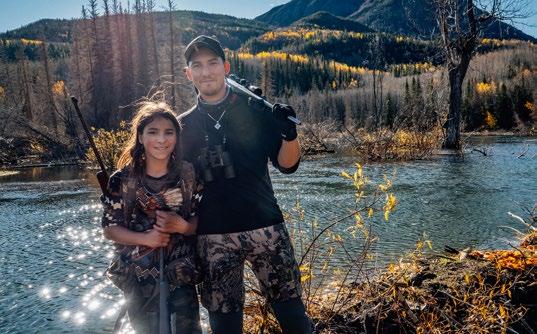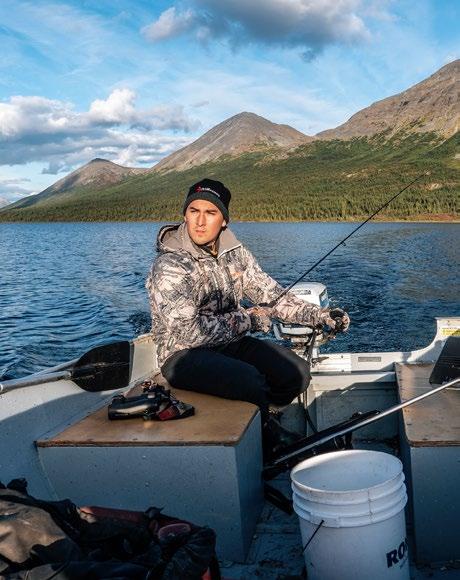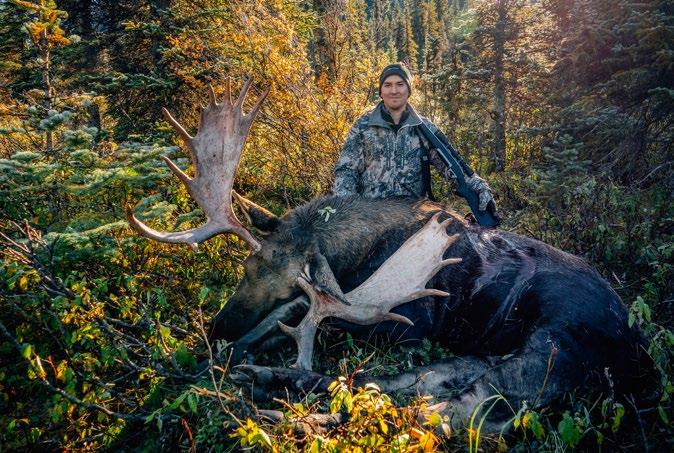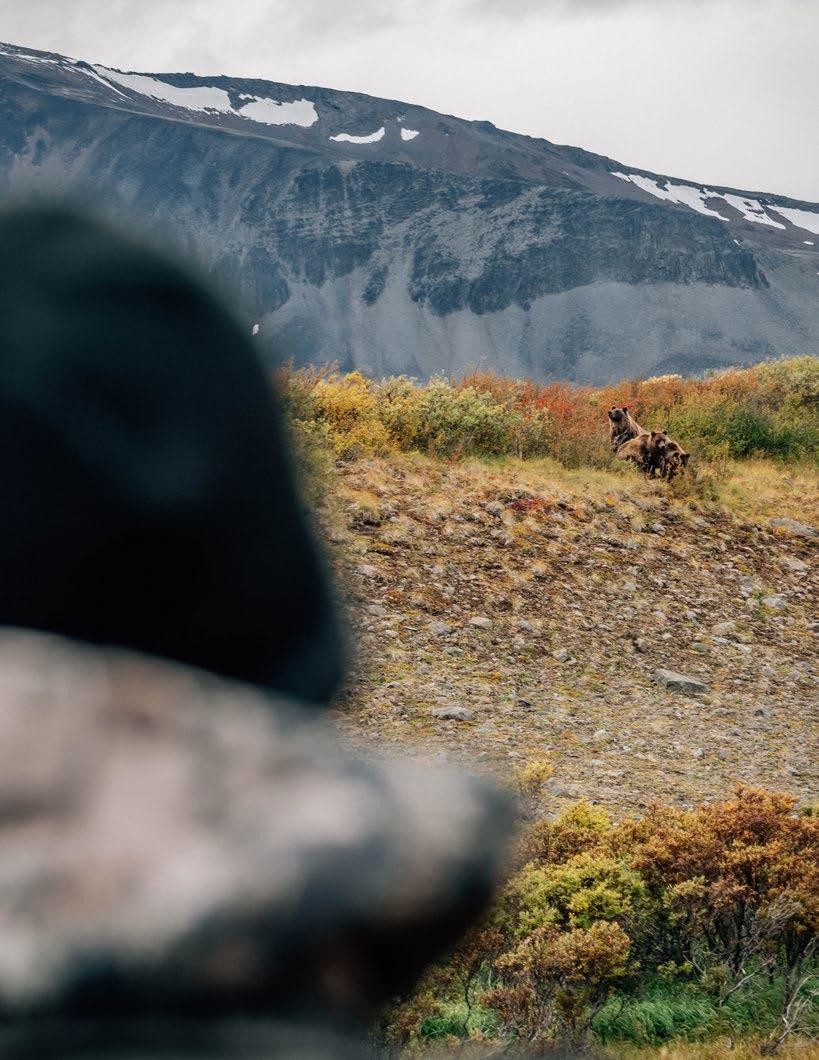
14 minute read
Nations & British Columbia
CONTENTS
WILDLIFE
Wildlife Director’s Message . . . . . . . . . . . . . . . . . . . . . . . . . . . . . . . . . . 7 Guardians Message . . . . . . . . . . . . . . . . . . . . . . . . . . . . . . . . . . . . . . . . . 9 Tahltan Travel Advisory . . . . . . . . . . . . . . . . . . . . . . . . . . . . . . . . . . . . . 11 Predator Management Policy & Framework . . . . . . . . . . . . . . . . 13 Tahltan Harvest Policy . . . . . . . . . . . . . . . . . . . . . . . . . . . . . . . . . . . . . . 16 Tahltan Guide & Outfitters Association Message . . . . . . . . . . . 19 3 Nations & British Columbia Collaborative Stewardship Forum Update . . . . . . . . . . . . . . . . . . 20 Jade Boulder Sheep Project . . . . . . . . . . . . . . . . . . . . . . . . . . . . . . . . 21 Tseneglode Caribou Update . . . . . . . . . . . . . . . . . . . . . . . . . . . . . . . . 23 Caribou & Wolf Collaring Projects . . . . . . . . . . . . . . . . . . . . . . . . . . 25 Klappan Moose Classification Survey & Stewardship Plan . . 29 Guardians Training . . . . . . . . . . . . . . . . . . . . . . . . . . . . . . . . . . . . . . . . . 31
FEATURES
Successful Hunts & Fishing by Tahltans . . . . . . . . . . . . . . . . . . . . 35
UPDATES
Tahltan-BC Government-to-Government Fish & Wildlife Working Group . . . . . . . . . . . . . . . . . . . . . . . . . . . . . . 45
FISHERIES
Fisheries Director’s Message . . . . . . . . . . . . . . . . . . . . . . . . . . . . . . . 49 Fisheries Guardian Update . . . . . . . . . . . . . . . . . . . . . . . . . . . . . . . . . 51 Fisheries Project Overview Map . . . . . . . . . . . . . . . . . . . . . . . . . . . . 53 The Stikine River Salmon Studies – Biological Contract . . . . 55 Fisheries Projects . . . . . . . . . . . . . . . . . . . . . . . . . . . . . . . . . . . . . . . . . . 59 Fisheries-related Indigenous Protected & Conservation Areas (IPCA) Projects . . . . . . . . . . . . . . . . . . . . . . 67 DFO Real Properties – Facility Upgrades . . . . . . . . . . . . . . . . . . . 69 Tahltan Lake Egg Take (1989-2020) . . . . . . . . . . . . . . . . . . . . . . . . 70 Memorial Monument of Tahltan Lake . . . . . . . . . . . . . . . . . . . . . . 71
TAHLTAN NATION
Hunting of Predatory Species Policy
PREAMBLE
WHEREAS the Tahltan Nation has inhabited and harvested resources throughout its traditional territory in the upper Stikine River region of British Columbia and Yukon (“Tahltan Territory”) since time immemorial, pursuant to which the Tahltan Nation possesses Aboriginal rights, including Aboriginal title to, and Aboriginal rights to hunt throughout, Tahltan Territory (“Tahltan Rights”);
AND WHEREAS the Tahltan Rights to hunt within Tahltan Territory encompass both the right to hunt for food, social and ceremonial purposes as well as the right to hunt predatory species for resource management purposes, as both of these hunting practices were integral to the distinctive culture of Tahltan Nation’s pre-contact society;
AND WHEREAS the Tahltan Rights to hunt for food, social and ceremonial purposes, as well as for resource management purposes, are not species-specific, as the Tahltan Nation’s consumption and conservation practices necessarily adapted in response to changes within Tahltan Territory;
AND WHEREAS Tahltan Rights held by the Tahltan Nation, including Tahltan title and rights to hunt, are collective rights that belong to the Tahltan Nation as a whole;

AND WHEREAS the Tahltan Nation has inherent jurisdiction and authority over the lands, resources and interests in Tahltan Territory, which includes jurisdiction and authority over the manner in which its collective title and rights to hunt may be exercised;
AND WHEREAS section 35 of the Constitution Act, 1982 recognizes and affirms the existing Aboriginal and treaty rights of the Aboriginal peoples of Canada, including the inherent right to self-governance;
AND WHEREAS the Supreme Court of Canada has recognized that Aboriginal rights, including Tahltan Rights, are not frozen in time and are capable of evolving from pre-contact practices, customs and traditions, both in terms of methods of harvest and species harvested;
AND WHEREAS on November 28, 2019, the Province of British Columbia (the “Province”) passed the Declaration on the Rights of Indigenous Peoples Act, which mandates that the Province bring its laws into harmony with the United Nations Declaration on the Rights of Indigenous Peoples, including the following rights belonging to Tahltan Nation:
• to autonomy or self-government in matters relating to Tahltan Nation internal and local affairs, as well as ways and means for financing their autonomous functions (article 4);
• to practice and revitalize Tahltan Nation cultural traditions and customs, including the right to maintain, protect and develop the past, present and future manifestations of
Tahltan cultures (article 11); • to determine and develop priorities and strategies for exercising Tahltan
Nation’s right to development, which includes the right to be actively involved in developing and determining economic and social programs affecting Tahltan members and, as far as possible, to administer such programs through Tahltan institutions (article 23);
• to maintain and strengthen Tahltan Nation’s distinctive spiritual relationship with their traditionally owned or otherwise occupied and used lands, territories, and resources and to uphold their responsibilities to future generations in this regard (article 25);
• to the lands, territories and resources that the Tahltan Nation has traditionally owned, occupied or otherwise used or acquired, including the right to use, develop and control those lands, territories and resources (article 26);
• to the conservation and protection of the environment and the productive capacity of Tahltan Nation lands and resources (article 29);
• to determine and develop priorities and strategies for the development or use of their lands or territories and other resources (article 32); and
• to promote, develop and maintain Tahltan Nation institutional structures and distinctive customs, spirituality, traditions, procedures, practices (article 34);
AND WHEREAS effective April 1, 2018 the Province amended the regulations of the Wildlife Act in a manner that prohibits hunting of grizzly bear (the “Grizzly Ban”);
AND WHEREAS the Province has confirmed that such Grizzly Ban does not apply to the exercise of Aboriginal rights to hunt grizzly bear for food, social, or ceremonial purposes;
AND WHEREAS due to the combined effect of unauthorized settler development and industrial activity within Tahltan Territory and the Province’s wildlife management laws and regulations, including the Grizzly Ban, predatory species are proliferating within Tahltan Territory and threatening Tahltan Nation’s access to traditional food sources, ability to meaningfully exercise the right to hunt for food, social and ceremonial purposes, and the safety of its community;
AND WHEREAS Tahltan Nation, through Tahltan Central Government (“TCG”), is committed to protecting its practices, culture, community, and economic prosperity, while safeguarding Tahltan Territory and the resources located thereon for the use and benefit of present and future Tahltan members;
AND WHEREAS it is in the interests of the Tahltan Nation to enact a policy addressing the exercise of Tahltan Rights to hunt grizzly bear and other predatory species within Tahltan Territory by Tahltan members for food, social and ceremonial purposes and for resource management purposes;
NOW THEREFORE the Tahltan Nation hereby enacts the following Tahltan Hunting of Predatory Species Policy.
Message from
the President
Below: President Day hunting with his son Malakai.
Chad Norman Day
President, Tahltan Central Government

Welcome to the first annual Tahltan Central Government (TCG) Fish & Wildlife Newsletter! Although this is the third newsletter we have created with initiatives specific to wildlife, this year we added fish as the TCG officially took over administration and jurisdiction of the Fisheries Department.
Having these two vital departments working under our government and in tandem is an exciting evolution which will increase efficiency and productivity for the Tahltan Nation’s fisheries and wildlife into the future.
I am thrilled to welcome some new members to the TCG Family. Cheri Frocklage has been the backbone of the Fisheries Department for decades and we look forward to providing her with further funding, political support, and collaborative efforts to advocate for our beloved fish. Working alongside her is Kerry Carlick, who fits wonderfully with our passionate and experienced team. Lastly, we are proud to have also inherited an amazing core of seasonal fisheries staff, many who have worked in the department for several years. I look forward to getting to know the Fisheries Department and all its staff members better in 2021 and beyond. This was a very challenging fall season, unlike anything we have ever experienced. The ongoing vulnerabilities in our homeland during the COVID-19 pandemic, coupled with the influx of resident hunters during the hunting season, created a very stressful situation within Tahltan Territory. I commend everyone who assisted us in keeping our communities safe and thank our people for your ongoing patience as we continue taking measures to limit the traffic and activities in our local communities of Iskut, Dease Lake and Telegraph Creek.
The Wildlife Department went above and beyond this year by expanding their program to block off over 20 access points with concrete blocks and gates. They also hired more seasonal staff to assist in our collective goal of keeping visitors away from our vulnerable communities. We expect these collective efforts, coupled with robust communication from the TCG and our media partners, helped limit recreational and hunter traffic by at least fifty to seventy-five percent. We were highly disappointed by the lack of support offered by the Province in various respects but this did not stop us from taking matters into our own hands, as our people have done since time immemorial. “Once we successfully established the Wildlife Department and were able to collect more information on the landscape in conjunction with other wildlife stakeholders, our concerns and outrage with the mismanagement increased. I expect to experience a similar pattern with the Fisheries Department, particularly with the alarming decline of the Chinook stocks and some concerning issues with predator management along BC’s and Alaska’s coastlines.”
When I became President of the TCG, there was no mandate or staff to oversee wildlife and fisheries initiatives, but we quickly learned about the mismanagement of these sacred resources and the negative impacts this was having on Tahltan rights, food sustainability, and our future culture and identity. Once we successfully established the Wildlife Department and were able to collect more information on the landscape in conjunction with other wildlife stakeholders, our concerns and outrage with the mismanagement increased. I expect to experience a similar pattern with the Fisheries Department, particularly with the alarming decline of the Chinook stocks and some concerning issues with predator management along BC’s and Alaska’s coastlines. We have so much work to do as a Tahltan Nation and are getting stronger every year.
I have personally put Premier John Horgan and his key ministers and staff on notice with the following message: “There will be no world class
mining jurisdiction in Tahltan Territory unless we work together to ensure we also have world class
wildlife management.” This new era must utilize best practices in a true government-to-government collaboration between the Tahltan Nation and BC, which respects the authority and knowledge of the Tahltan people. The Tahltan Stewardship Initiative (TSI) has a team of leaders, negotiators, wildlife experts and legal counsel working together to achieve this important goal. The Province is taking our position on wildlife management very seriously; they have no choice at this point. Due to COVID-19, I could only make two trips to Tahltan Territory in the past several months. During both visits I made it a priority to get out on the land to walk in our Ancestors’ footsteps and continue learning about our Tahltan lands, wildlife, and culture. We hiked and camped on Level Mountain where we witnessed the influx of Grizzly Bears, I harvested my first Moose outside of Dease Lake and distributed the meat to our Elders, and I spent a few days in the Sheslay Valley and saw the way Beaver dams and industrial activities are having huge impacts on fisheries and wildlife habitat. Without the distractions of technology and social media, these days in the wilderness were very rewarding and life changing. I will ensure that hunting and fishing become traditions I share and experience with my children, extended family, future grandchildren, and others for years to come.

Above: President Day fishing on Cry Lake.


Above: President Day's moose harvest. I am extremely proud of the work we accomplished in creating and implementing the TCG’s new Predator Management Program. Let’s hope other Indigenous peoples, politicians and more follow our example on this controversial and important issue, which impacts everyone. Predator management has always played a vital role in responsible wildlife management and balance; I believe our Ancestors are proud of us for taking this initiative and important practice back into our own hands. I encourage our Tahltan people to help us harvest predators in order to save ungulates, create more balance on the landscape, and have some fun practicing our culture with their loved ones and communities in the process.
We must commend our TCG Wildlife and Fisheries staff, those who advocate for our fish, wildlife and ecosystems, and everyone else in the background who partners with the Tahltan Nation and supports our growing team. I thank our beloved Ancestors who allowed us to inherit a rich culture and homeland abundant in fish, wildlife, and everything else that sustained us for thousands of years. Mēduh to all our Elders, locals and others who ensure our Tahltan knowledge, both past and present, is continually being shared and evolving to help us make decisions and deal with the challenges we face today.
We as human beings are currently experiencing the threat of a pandemic and it’s very concerning. However, let us remember our fish and wildlife in Tahltan Territory and most parts of British Columbia and Canada have been facing negative impacts from a mismanagement pandemic for generations. Therefore, we will continue to assert our authority as Tahltan people to take back stewardship of our animals and homelands. We must help them thrive again in our Territory because the balance and health of our wildlife and fisheries goes hand-in-hand with our Tahltan history, culture, identity and our future.
Klane Nedischā.
President Day encounters a sow grizzly and two cubs on Level Mountain.










